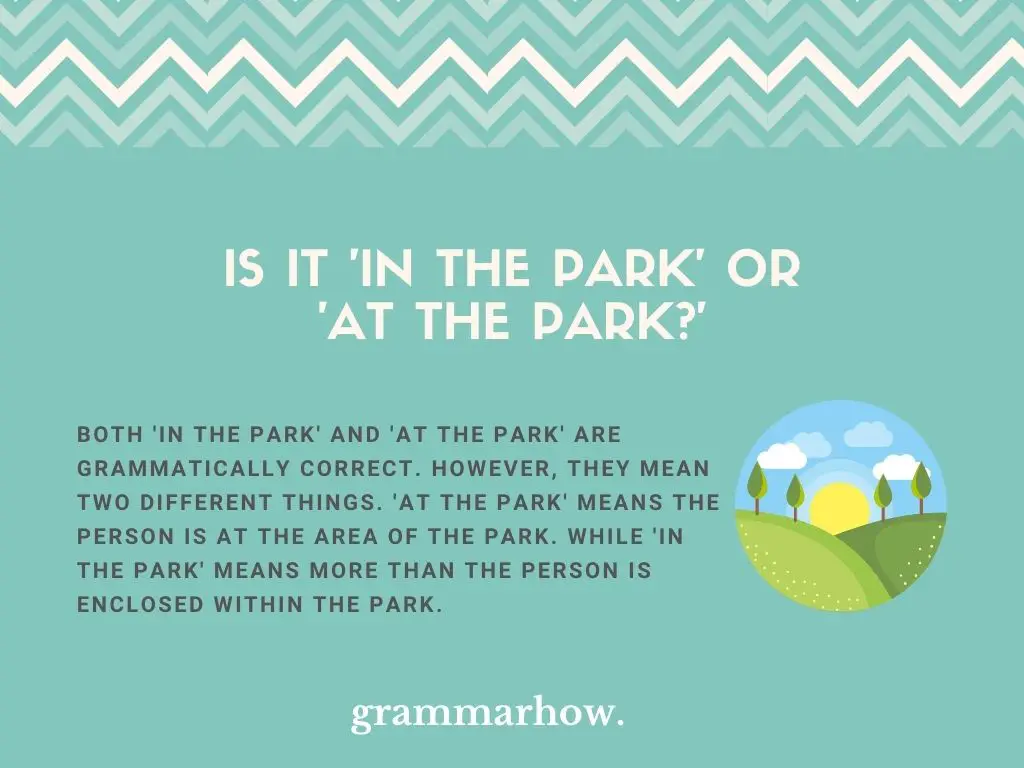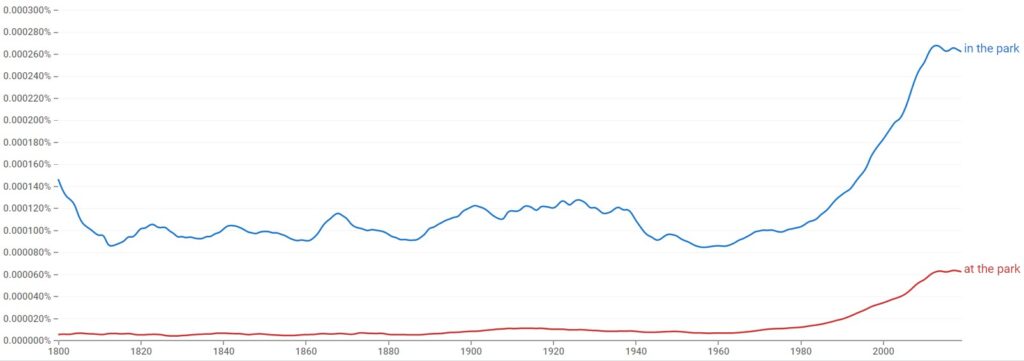Prepositions are like the dark horses of the English language. Who would have known that such a small presence has such essential influence? They’re powerful in as much as changing the meaning of what you’re trying to say. Today, let’s explore the power of ‘in’ and ‘at.’
Is It ‘In The Park’ Or ‘At The Park?’
Both ‘in the park’ and ‘at the park’ are grammatically correct. However, they mean two different things. ‘At the park’ means the person is at the area of the park. While ‘in the park’ means more than the person is enclosed within the park.

‘At the park’ and ‘in the park’ differ in what their scope of the park is. ‘At the park’ seems more general and may mean in the actual park, in the park’s playground, or even the parking lot, if there’s one. ‘In the park’ is more specific, and it means that the person is enclosed within the park. It could also mean inside, for indoor parks.
What Does ‘In The Park’ Mean?
‘In the park’ means that a person is within a park. The preposition ‘in’ specifies that the person is in the park itself and not anywhere else near the park. It can also mean inside a park if it is indoor or has an enclosure.
The preposition ‘in’ here sees the park or any place as containment or enclosure. In this case, ‘in’ would usually mean synonymous with ‘within’ or ‘inside.’ While this is easy to understand if the park was indoor, it may be a bit confusing for an outdoor park. In the context of an outdoor park, it considers the boundaries of the park. So, if a person is ‘in the park,’ it means that the person is within the boundaries of the recreation area.
Take a look at this example below.
- I’ll wait for you in the park.
In the sentence, the speaker implies that he/she will wait for the person within the park’s boundaries, whether indoor or outdoor.
Below are more examples of using ‘in the park’ in a sentence.
- She’s in the park, playing with Kesha.
- Have you seen what’s in the park? It’s really nice there.
- We were in the park a while ago, and we just left.
- I’ll sit down in the park and take a rest.
- I didn’t see you in the park. Were you also there?
- My family is playing in the park.
- Let’s meet each other in the park.
What Does ‘At The Park’ Mean?
‘At the park’ means that a person is around the area of a park. It may be on the park’s sidewalk, park’s playground, or elsewhere. But, it does not necessarily mean enclosed within the park grounds only. It regards ‘park’ more as a general location.
The preposition ‘at’ regards a park or any place, as a point in space, like an ‘x’ on a map. It makes ‘at the park’ more general as the person can be anywhere by that ‘x’ per se. However, it does not specify where in particular the person is, just around the area of the park.
Take a look at the example below.
- She’s at the park right now.
Here, ‘at the park’ signifies the person’s location at the moment is the park, but it doesn’t specify where exactly around the park’s area the person is. It is more of a general location that the person’s current address is the park.
Below are examples of using ‘at the park’ in a sentence below.
- She’ll be at the park later this afternoon.
- I’m at the park, where are you?
- Let’s just meet at the park. Is that okay?
- Are you at the park already? I’ll be right there.
- Tanya said she was at the park yesterday.
- I’m not at the park right now. I just left.
- We’re at the park. Will you come to meet us?
Are ‘In The Park’ And ‘At The Park’ Interchangeable?
‘In the park’ and ‘at the park’ are interchangeable depending on how specific or how general the context needs to be. If there’s no need to be specific, either of the phrases works. But, if there is a need to be specific, only ‘in the park’ works.
Take a look at the two examples below.
- I’m at the park right now.
- I’m in the park right now.
The two phrases may be interchangeable depending on the situation. The first sentence implies something more general, while the second sentence implies something more specific. Now, let’s give the context of the sentences.
If a person who is not at the park asks where you are, replying with either ‘I’m at the park right now’ or ‘I’m in the park right now’ works since the person needs not to ask for your specific location. However, if a person who is also in the park asks where you are, replying with ‘I’m in the park right now’ is more favorable as it specifies where specifically you are.
Is ‘In The Park’ Or ‘At The Park’ Used The Most?
According to the Google Ngram Viewer, ‘in the park’ is used more often than ‘at the park.’ It is probably because most people regard the ‘park’ as an enclosed or bounded area that a person is to be in, rather than just a point on the map.

Which Other Prepositions Can Be Used Before ‘The Park?’
‘Park’ is a common name for a place or a location which makes it compatible with most prepositions. Some of the other common prepositions we use are ‘by the park,’ ‘across the park,’ and ‘outside the park.’ Let’s explore what each means below.
By The Park
‘By the park’ follows the meaning of the preposition ‘by,’ which means beside or in proximity to the park. So, if a person is ‘by the park,’ it means that the person is near or within the vicinity of the park.
Below are examples of using ‘by the park’ in a sentence.
- Did you happen to see anything by the park?
- I was just walking by the park a while ago.
Across The Park
‘Across the park’ follows the meaning of the preposition ‘across,’ which means on the opposite side of a place. So, if a person is ‘across the park,’ they are on the opposite side of where the park is. Possibly, across the street from where the park is.
Below are examples of using ‘across the park’ in a sentence.
- There’s a donut shop across the park.
- I think someone’s waiting for you across the park.
Outside The Park
‘Outside the park’ follows the meaning of the preposition ‘outside,’ which means out of the vicinity or the boundary of a place. So, if a person is ‘outside the park,’ they are not within its boundary but out of it. Usually, it signifies the person is near but not inside.
Below are examples of using ‘outside the park’ in a sentence.
- There are so many people waiting outside the park?
- Can we see what’s outside the park?

Martin holds a Master’s degree in Finance and International Business. He has six years of experience in professional communication with clients, executives, and colleagues. Furthermore, he has teaching experience from Aarhus University. Martin has been featured as an expert in communication and teaching on Forbes and Shopify. Read more about Martin here.
